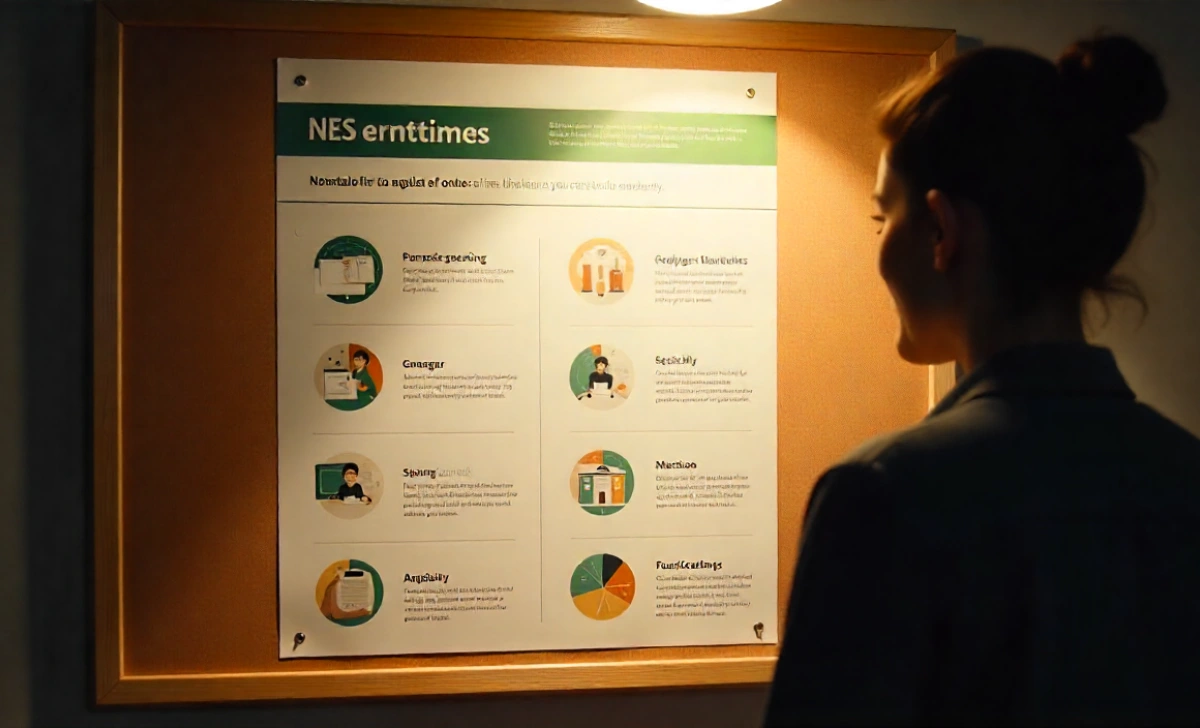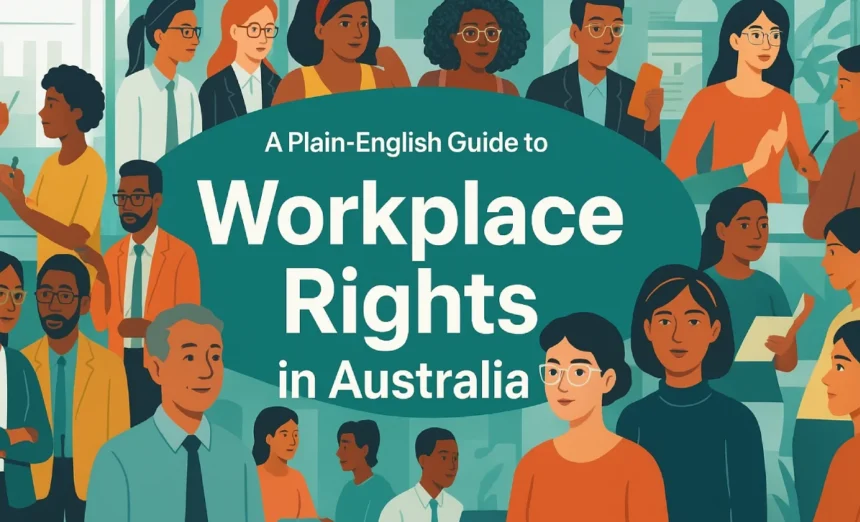Are you wondering if you’re being paid fairly? Concerned about whether you can be dismissed without reason? Unsure what leave you’re actually entitled to? You’re not alone—these questions keep many Australian workers awake at night.
- Workplace rights in Australia — the basics (NES, who’s covered)
- The National Employment Standards — your 10 minimum entitlements (breakdown)
- Maximum weekly hours and requests for flexible work
- Annual leave and personal/carer’s leave
- Parental leave
- Public holidays, notice of termination and redundancy pay basics
- Other NES items (community service leave, compassionate leave, long service, etc.)
- Pay, awards and employment agreements — how to check you’re getting the right wage
- Unfair dismissal — eligibility, time limits and what to expect
- General protections & unlawful adverse action (bullying, discrimination, exercising workplace rights)
- Parental leave, carers’ leave and family-friendly entitlements — what to know (and recent updates)
- How to escalate a workplace problem — Fair Work, tribunals, legal aid and small claims
- Practical checklist — what to do right now if your workplace rights are breached
- FAQs
- Conclusion
Understanding your workplace rights Australia doesn’t have to be overwhelming. This practical guide breaks down the National Employment Standards, unfair dismissal basics, and parental leave entitlements, and shows you exactly where to turn when problems arise. Whether you’re starting your first job or dealing with workplace issues, knowing your rights protects both your livelihood and peace of mind.
Let’s cut through the legal jargon and get straight to what matters for your working life.
Workplace rights in Australia — the basics (NES, who’s covered)
Your workplace rights are the legal protections and entitlements that apply to your employment relationship. These rights primarily depend on whether you’re classified as an employee or an independent contractor—a distinction that determines which protections cover you.
The foundation of Australian workplace rights is the National Employment Standards (NES), which sets out 10 minimum entitlements that employers must provide to most employees. Think of the NES as your safety net—these standards apply regardless of what industry you work in or what your contract says.
According to the Fair Work Ombudsman, “The NES are part of the Fair Work Act and apply even where an award, agreement or contract exists.” This means your employer can’t offer you less than these minimums, even if you agree to it.
The key distinction lies in how you work: employees typically work under someone else’s direction, use company equipment, and receive regular wages with tax deducted. Contractors usually control how they complete work, use their own tools, and invoice for services.
Key takeaway: If you’re an employee (not a contractor), the NES automatically protects you. Even casual employees and those on probation receive these protections from day one.
The National Employment Standards — your 10 minimum entitlements (breakdown)
The NES provides 10 fundamental workplace entitlements that form the backbone of Australian employment law. These aren’t just suggestions—they’re legal requirements your employer must meet. Let’s break down the most important ones that affect your daily working life.
Maximum weekly hours and requests for flexible work
You have the right to refuse unreasonable requests to work more than 38 hours per week (or the ordinary hours specified in your award). Additionally, if you’ve worked for the same employer for at least 12 months, you can request flexible working arrangements for various reasons, including caring responsibilities, disability, or if you’re 55 or older.
Your employer must consider your request in good faith and can only refuse on reasonable business grounds, providing you with written reasons within 21 days.
Annual leave and personal/carer’s leave
Full-time and part-time employees accumulate four weeks of paid annual leave each year, while casual employees receive a 25% loading instead of paid leave. You also accrue 10 days of paid personal/carer’s leave annually, which can be used when you’re ill or need to care for a family member.
Personal leave accumulates year to year if unused, but annual leave policies vary between employers. Some encourage regular leave-taking to prevent excessive accumulation.
Parental leave
Eligible employees can take up to 12 months of unpaid parental leave, with the option to request an additional 12 months. This applies to birth parents, adoptive parents, and partners. You’re also protected from discrimination related to pregnancy and parental responsibilities.
We’ll dive deeper into parental leave entitlements, including government payments, in a dedicated section below.
Public holidays, notice of termination and redundancy pay basics
You’re entitled to public holidays off with pay (or penalty rates if you work), reasonable notice before termination (or payment in lieu), and redundancy pay if your job is made redundant after at least 12 months of service.
The Fair Work Ombudsman emphasises that “if your award says less, it can’t be below NES minimums”—your award or agreement can provide better conditions, but never worse.
Other NES items (community service leave, compassionate leave, long service, etc.)
Additional entitlements include unpaid community service leave (jury duty, emergency services), compassionate leave for death or life-threatening illness of close family members, and long service leave (typically after 7-10 years, depending on your state).

Pay, awards and employment agreements — how to check you’re getting the right wage
Getting paid correctly involves more than just your hourly rate—it’s about understanding the complex interaction between minimum wages, awards, enterprise agreements, and individual contracts.
Australia’s wage system works in layers. At the bottom is the National Minimum Wage (currently $23.23 per hour as of July 2024). Above this sit Modern Awards, which set industry-specific minimums that are typically higher than the national minimum. Enterprise agreements can provide even better conditions, and individual contracts sit at the top—but they can’t provide less than your applicable award.
The Fair Work Ombudsman’s Pay Calculator is your best friend for checking if you’re being paid correctly. Simply input your industry, role, and hours worked, and it will calculate your minimum entitlements, including penalty rates for weekends, public holidays, and overtime.
Example: A retail worker classified as Level 2 under the General Retail Industry Award earns a minimum base rate of $24.70 per hour (as of 2024), plus penalty rates for evening and weekend work. Saturday work attracts a 25% loading, while Sunday work receives 50% extra.
Don’t just trust your payslip—verify it. Check that your classification matches your actual duties, ensure penalty rates are applied correctly, and confirm your leave entitlements are accruing properly. Many wage theft cases occur because employees don’t realise they’re being underpaid.
Keep detailed records of your actual hours worked, including start and finish times, break periods, and any work performed outside normal hours. This documentation becomes crucial if you need to make a claim.
Unfair dismissal — eligibility, time limits and what to expect
Losing your job can be devastating, but not all dismissals are legal. Understanding unfair dismissal laws could be the difference between accepting your fate and successfully challenging wrongful termination.
An unfair dismissal occurs when your termination is harsh, unjust, or unreasonable. However, not everyone can make an unfair dismissal claim. You must have worked for your employer for at least six months (12 months for small businesses with fewer than 15 employees), and you must be covered by the national workplace relations system.
The most crucial factor is timing. You have just 21 calendar days from the date of dismissal to lodge your application with the Fair Work Commission. This deadline is strictly enforced—miss it, and you’ll likely lose your right to make a claim, though the Commission may allow extra time in exceptional circumstances.
The Fair Work Commission can order reinstatement (getting your job back) or compensation of up to six months’ wages. However, reinstatement is rare—most successful cases result in compensation payments.
Step-by-step: what to do after dismissal
First, gather all relevant documents: your employment contract, performance reviews, disciplinary warnings, and the termination letter. Document the circumstances of your dismissal while they’re fresh in your memory.
Next, lodge your Form F2 – Application for Unfair Dismissal Remedy with the Fair Work Commission within 21 days. The application fee is $76.60, though this may be waived if you’re experiencing financial hardship.
The process typically involves conciliation—a conference where both parties try to reach an agreement with help from a Commission member. If conciliation fails, your case proceeds to a formal hearing where evidence is presented and a decision is made.
General protections & unlawful adverse action (bullying, discrimination, exercising workplace rights)
Beyond unfair dismissal, Australian law provides broader protections against workplace discrimination and retaliation. These “general protections” shield you from adverse action when you exercise your workplace rights or possess certain protected attributes.
Adverse action includes dismissal, demotion, reducing hours, changing duties to your disadvantage, or treating you unfairly because you’ve made a complaint, joined a union, or exercised other workplace rights. It also covers discrimination based on race, gender, age, disability, political opinion, religion, or other protected characteristics.
Real example: An employee raised safety concerns about inadequate protective equipment. Two weeks later, their shifts were reduced from full-time to casual hours. This could constitute adverse action, as the timing suggests a connection between the safety complaint and the hour reduction.

Unlike unfair dismissal claims, general protections applications don’t have minimum employment periods—you’re protected from day one. You can lodge a general protections claim up to 60 days after the adverse action (though this may be extended in certain circumstances).
The Fair Work Commission handles these claims through a similar process to unfair dismissal: application, conciliation, and potentially a formal hearing. Remedies can include reinstatement, compensation, or orders requiring your employer to stop the unlawful conduct.
Parental leave, carers’ leave and family-friendly entitlements — what to know (and recent updates)
Australia’s parental leave system combines workplace entitlements with government support, though navigating both can be complex. Understanding what you’re entitled to helps you plan financially and emotionally for this significant life change.
Under the NES, eligible employees can take up to 12 months of unpaid parental leave, with the ability to request an additional 12 months. To qualify, you must have worked for your employer for at least 12 months and be the primary carer of a newborn or newly adopted child.
Both parents can take parental leave, but not at the same time unless it’s for the birth of multiple children or in exceptional circumstances. Partners are entitled to up to two weeks of unpaid leave around the birth or adoption.
Paid parental leave & government changes
The Australian Government provides Paid Parental Leave through Services Australia—currently up to 20 weeks at the national minimum wage. Recent changes announced in 2024 will see this increase to 26 weeks by 2026, with greater flexibility for families to share leave between parents.
Some employers offer additional parental leave benefits beyond government and NES minimums. These might include employer-funded paid leave, superannuation contributions during unpaid leave periods, or gradual return-to-work programs.
The Fair Work Ombudsman provides detailed information on notification requirements, medical certificates, and keeping in touch arrangements during leave.
Remember, taking parental leave doesn’t affect your right to return to your position (or equivalent role if your job no longer exists). You’re also protected from discrimination related to pregnancy, parental responsibilities, or taking family leave.
How to escalate a workplace problem — Fair Work, tribunals, legal aid and small claims
When workplace problems arise, knowing where to turn can save you time, money, and stress. Australia has several pathways for resolving employment disputes, each suited to different types of issues.
Start internally where possible. Many workplace problems can be resolved through direct conversation with your supervisor or HR department. Most employers have internal grievance procedures—use these first, as external bodies often ask whether you’ve attempted internal resolution.
If internal processes fail or aren’t appropriate, the Fair Work Ombudsman is your next stop for unpaid wages, entitlement disputes, or workplace law breaches. They provide free advice and can investigate complaints, potentially recovering money owed to you.
For dismissal-related issues, lodge applications directly with the Fair Work Commission for unfair dismissal or general protections claims. The Commission also handles disputes about enterprise agreements and some award interpretation matters.
Free legal help: Community legal centres and Legal Aid provide free or low-cost employment law advice. The National Employment Law Network offers specialist employment lawyers who understand worker rights.
For smaller monetary disputes (typically under $25,000), state civil and administrative tribunals provide a cheaper alternative to courts. These tribunals have simplified procedures and often allow self-representation.
Contact points:
- Fair Work Infoline: 13 13 94
- Fair Work Commission: www.fwc.gov.au
- Legal Aid: Contact your state Legal Aid office
Practical checklist — what to do right now if your workplace rights are breached
Don’t wait until problems escalate—taking action early protects your rights and improves your chances of a successful outcome. Here’s your immediate action plan:
Document everything: Save all payslips, employment contracts, emails, and text messages related to the issue. Create a dated log of incidents, including times, locations, and witnesses present. This evidence becomes crucial if you need to make a formal complaint.
Communicate in writing: Follow up verbal conversations with emails summarising what was discussed. Use phrases like “As discussed in our meeting today…” to create a paper trail.
Contact Fair Work Ombudsman: Call 13 13 94 for free advice about your situation. They can clarify your rights and explain the options available to you.

Sample complaint email to employer: “Dear [Manager/HR], I am writing to formally raise concerns about [specific issue]. On [date], [describe what happened]. I believe this may breach [relevant policy/law]. I would appreciate the opportunity to discuss this matter and work towards a resolution. Please confirm receipt of this email and advise when we can meet to discuss.”
Seek early legal advice: Many community legal centres offer free initial consultations. Getting advice early helps you understand your rights and avoid common pitfalls that could weaken your case.
Consider mediation: Before formal proceedings, mediation can resolve disputes faster and cheaper than tribunals or courts. Both Fair Work and private mediators offer these services.
FAQs
Q: Do time limits apply to all workplace claims?
Yes, most have strict deadlines. Unfair dismissal: 21 days. General protections: 60 days. Wage recovery: 6 years. Don’t delay seeking advice.
Q: Who enforces workplace laws in Australia?
The Fair Work Ombudsman enforces workplace laws, while the Fair Work Commission handles dismissal claims and enterprise agreement disputes.
Q: Do NES protections apply to contractors?
No, the NES only covers employees. However, contractors have some protections under general contract law and may be entitled to unfair contract protections in certain circumstances.
Q: Can my employer reduce my hours without notice?
Generally no, unless your contract allows it or there are genuine operational reasons. Significant changes may breach your contract or constitute adverse action.
Q: What happens if my employer goes bankrupt?
The Fair Entitlements Guarantee (FEG) may cover unpaid wages, leave, and redundancy pay up to certain limits. Contact the Department of Employment immediately.
Q: Can I be fired during probation?
Probationary employees have the same unfair dismissal rights as other employees, though employers have more flexibility during genuine probation periods.
Conclusion
Your workplace rights in Australia rest on three key pillars: the National Employment Standards providing minimum entitlements, awards and agreements setting fair pay rates, and protections against unfair dismissal and discrimination. These aren’t just legal concepts—they’re practical tools that protect your livelihood and dignity at work.
Whether you’re checking if you’re paid correctly, dealing with workplace conflicts, or planning parental leave, knowing your rights puts you in control. Bookmark the Fair Work Ombudsman website, keep detailed records of your employment, and don’t hesitate to seek help early when problems arise.
Take action today: Download our comprehensive workplace rights toolkit, bookmark key Fair Work resources, and share this guide with colleagues who might need it. Remember, understanding your rights is the first step to protecting them—and yourself.






